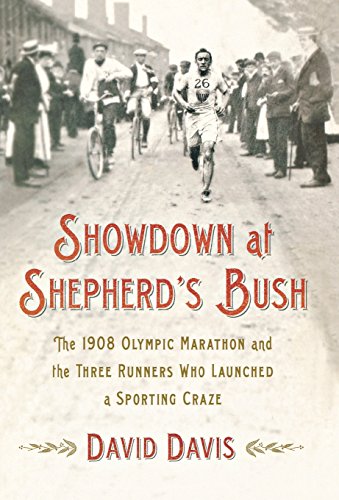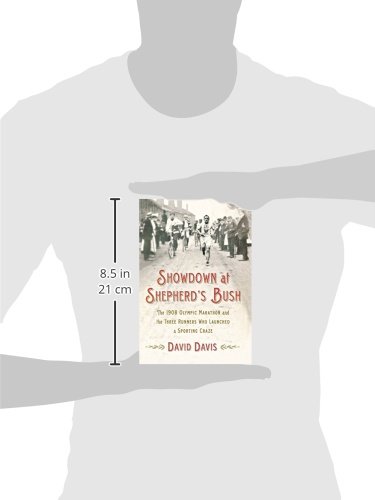Customer Services
Customer Support

Desert Online General Trading LLC
Warehouse # 7, 4th Street, Umm Ramool, Dubai, 30183, Dubai
Copyright © 2025 Desertcart Holdings Limited




Full description not available
K**N
Great history of early Olympic marathoning
For those interested in the origins and early history of Olympic marathoning--indeed, the birth of the long distance running movement--this is a wonderful book. And by "early history" I do not mean Pheidippides of ancient Greek days, although he does make a cameo appearance in this handsomely-written, well-researched, well-told story. The story focuses on the 1908 London Olympic Games Marathon, featuring three top runners of the time, all with compelling stories--notably an Italian, Dorando Pietri, who nearly dies while trying to finish what was then considered to be (and still is, to some degree) an impossibly long way to run. It would have been nice to see more accounts of racing in the early part of the book, which is largely devoted to setting the stage for the drama in London. But starting with the Games Marathon (which is written, in a stylistic change of pace, in the present tense), the author more than makes up for this with a series of terrific accounts of exciting post-London races. Showdown at Shepherd's Bush centers mainly on the early 20th century; my suggestion to Davis and his publisher would be to do a follow-up book, focusing on say, Frank Shorter's epic 1972 Olympic Games Marathon win and use that as a springboard to bring us up to date on the story of the modern running and marathoning movement. I'd read that book too.
B**N
Like "Duel in the Sun" for 1908
Davis has provided a fascinating and detailed story of not just the 1908 Olympic Marathon, but of the early days of marathoning, social stigmas attached to the pastime, and an insight into the men who took part in marathons at the turn of the twentieth century. Some have complained on here that the author goes off on tangents or rambles. Maybe those reviewers are not accustomed to reading scholarly work. While Davis does at times veer off onto tangents, they are all relevant to the primary focus of the chapter/sections. Excellent book. Well worth a read for fans of sport history, runners, and history buffs in general.
C**L
I liked the product very much! It was exactly what I wanted. Product was delivered fast, was as described and received professio
What a great read and much detail! I liked the product very much! It was exactly what I wanted. Product was delivered fast, was as described and received professional service!
C**T
Interesting cultural history
Here's a quick, enjoyable read to pass the time between events at the upcoming Olympics -- or, if you've soured on the commercialism, rampant doping, and overall "too-much-ness" of the modern version of the Games, a more than acceptable substitute for viewing same. Not that controversy is absent from this discussion of the 1908 London Olympics marathon; quite the opposite, in fact. Davis makes the argument that the half-dramatic, half-farcical conclusion of the '08 race ranks as the first "globally famous" sporting event. Surely, the combination of new technology (film), aggressive media coverage, and the holding of the Games in the seat of what was then the world's preeminent empire helped publicize this notable moment at a critical time when the future of the modern Olympic movement seemed in some doubt. But consider the fact that the intense interest in what transpired at the White City Stadium on that baking-hot July day firmly established the then-exotic marathon as a truly legitimate sporting event, and Davis' argument seems reasonably legitimate. Even if you are not particularly interested in running or the Olympics, SHOWDOWN AT SHEPHERD'S BUSH comes highly recommended as an interesting slice of early 20th century cultural history.SHOWDOWN AT SHEPHERD'S BUSH takes a parallel-lives approach in its early stages, sketching out the lives and times of three of the major figures in the '08 marathon: Dorando Pietri of Italy, Johnny Hayes of the U.S., and Onondaga Indian Tom Longboat of Canada. All three came from very humble beginnings and used long-distance running as a means of improving their lot -- though, with "simon-pure" amateurism still the announced and (generally) practiced Olympic ideal, they could not truly reap the financial benefits of their efforts until after the Games, when a series of match races between them and other leading marathoners launched a brief "running craze" that captivated America seven decades before Jim Fixx appeared on the scene. This was the "heroic age" of long-distance running, paralleling that of Polar exploration. Given the era's minimal understanding of race tactics and training procedures, inadequate footwear, and lack of recuperation time between races, not to mention the frequent holding of races in smoke-filled indoor arenas (such as the old Madison Square Garden), it's hard not to wince while reading about these early pie-a-pie encounters. In the course of his narrative, Davis gives us a useful potted history of early marathoning, brushing away some of the myths that have accreted around the race (e.g. the oft-repeated tale that the race was based on a courier's run to Athens following the battle of Marathon), describing the development of such early efforts at organization as the Boston Marathon, and relating the frequently shambolic details of the Olympic marathons of 1896, 1900, and 1904. The marathon at the 1906 "Intercalated Games," held in Athens in an effort to regain a bit of the prestige that had been lost as a result of the '00 and '04 Games being dominated by ongoing expositions in Paris and St. Louis, was only a bit more successful. Entering the '08 London Olympics, the future of the marathon as an Olympic event, to say nothing of the Games themselves, seemed anything but secure. But competent local organization (also well detailed by Davis) and the sparks from a bitter rivalry between the host British and the upstart Americans helped to refuel the flickering torch, and the sensational conclusion of the marathon finished the job. Save for forced breaks caused by world war, the continuation of the Olympics would never be seriously questioned again.Dorando's heroic failure and disqualification have come to mark him as "the most famous loser in Olympic history." Certainly, Hayes, who was declared the winner, is a forgotten man by comparison. Davis performs his most useful services by reminding the reader of Hayes' accomplishment (which the British, no surprise, did not much appreciate) and in rescuing the role of Longboat, the pre-race favorite, from obscurity. Longboat failed to complete the race, partially because he had sustained an injury while training in Ireland beforehand. The extent of said training -- with Longboat's trainer-promoter putting his charge through a series of lengthy runs before curious crowds -- further points up the exploitative, almost ad hoc nature of the culture of early long-distance running.Davis' writing gets a little too purple in places, but he accomplishes quite a lot in such a small package, providing a Cook's tour of early Olympic and long-distance history in addition to sketching out the details (in present tense, for some peculiar reason) of the headlined race. Much like THE GREATEST GAME EVER PLAYED or SEABISCUIT, this is a "sports history book" that the wider public should be able to fully appreciate.
Trustpilot
2 months ago
1 week ago